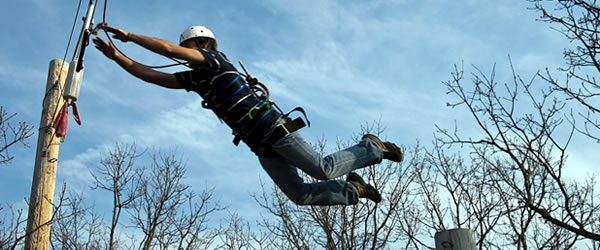Curriculum Units

Skills taught in the Discovery Program work for every type of student in any setting, rural or urban. By helping kids gain skills and confidence, Discovery guides troubled youth back into the school system and provides them the tools to be successful. The six units also help enhance core competencies and are easily adaptable to any scheduling matrix.
Discovery helps to recharge a teacher’s sense of commitment.
..after you’ve been in teaching for a while you just want to do something, just want to make an impact on kids lives. Discovery helped us do that. We get excited about doing the things we always wanted to do in education.Nate Yonkers, Teacher, Beecher High School, Flint, Michigan
Parents enjoy a renewed sense of hope.
“…we’ve seen it in our house. Candice communicates more, we communicate more. She’s a lot more bubbly. She’s acting like a kid and having fun. Discovery has her thinking about the future. She feels good about herself.” Paul and Rita Ridenour, Parents of a Discovery Student
The Discovery Program is designed to conform to any scheduling matrix. Additionally, the program may be adapted to meet the needs of all secondary students. Students are taught positive social-emotional skills necessary to thrive at school, home, and at work. Students learn these skills through direct instruction, teacher modeling, student practice, and positive feedback. As students become better communicators, they gain clarity and discover a renewed sense of optimism, and once again begin believing in themselves. The core of the Discovery Program is a student-centered, no-nonsense, skill-based curriculum taught in six sequential units.
Unit 1: Effective Group Skills And Team Building
Students are taught the importance of effective groups and begin practicing essential group skills. The unit emphasizes cooperation, synergy, appropriate risk-taking, clear communication, and positive mental attitudes.
Unit 2: Anger Management
This unit is a cognitive approach to managing anger and frustration. Students are taught skills to help them reframe anger and use it as a positive force in their lives as opposed to a destructive force. The model helps students identify their own triggers and cues to anger, and helps them develop alternative coping strategies.
Unit 3: Effective Communication
This unit is the cornerstone of the Discovery Program. The emphasis of this unit centers on teaching and practicing the three different modes of communication in Eric Berne’s Transactional Analysis. This is a two-week unit that requires sufficient blocks of time to teach, practice, and receive feedback on role-play scenarios. Students demonstrate knowledge of these skills by writing and performing a final role-play and passing objective quizzes and tests on content. Application of these skills to a students’ life outside of the classroom is imperative.
Unit 4: Assertiveness Training
The goal of this unit is to help students distinguish the difference between aggressive, assertive, and passive behaviors and responses. Assertiveness Training compliments previous lessons learned on Transactional Analysis. Students identify their typical behavior types and role-play assertive responses. While the model only takes a relatively short time to learn, it is a skill that must be continually practiced and reinforced.
Unit 5: Problem Solving
This unit focuses on solving problems in a systematic way utilizing five basic steps: Stop, List, Choose, Do, Evaluate. Although this unit appears to be concise and basic, it is the “umbrella skill” of the program. This unit takes time, and students need to be aware of the overall importance of approaching problems in their lives in an effective manner.
Unit 6: Conflict Resolution
This unit focuses on conflict and conflict management. These skills build directly upon TA, Assertiveness Training, and Problem Solving units. First, students are asked to identify the difference between problems and interpersonal conflicts, and then they are taught a systematic approach to dealing with conflict in a positive manner. We want students to be assertive and have the courage and skills necessary to resolve conflict in a positive manner.